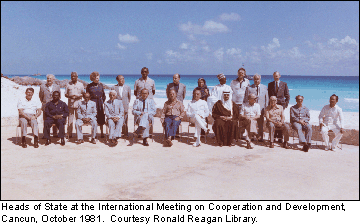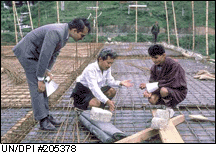|
|
The Brandt Proposals: A Report Card
Global Negotiations
|
North-South called for a summit of international leaders to discuss the foregoing array of development issues. Brandt hoped that these interrelated concerns would not remain under separate negotiations, to forever languish in the province of specialists. Rather, the Commission wished to see international development issues considered together and dealt with simultaneously by a wide-ranging group of world representatives, reflecting the realities of interdependence.
What was envisioned was an ongoing multilateral forum "for discussing the entire range of North-South issues among all the nations," with the goal of launching an international emergency relief program and creating a stable monetary and financial system (CC, 5). |
|

|
|
| If the Brandt Commission stood for anything, it was the principle of inclusion, of issues as well as nations: "The aim of 'global negotiations' is international consensus. This means that no single problem, energy or debt or food, for example, would be viewed in isolation without considering its direct implications on the full global agenda of interconnected issues" (CC, 5-6). |
|
| |

(view full image and story) |
|
At Brandt's invitation, twenty-two world leaders met in Cancun on October 22-23, 1981, to discuss the issues raised in North-South. |
|
|
Attending this meeting were President Reagan of the US, Prime Minister Thatcher of Britain, President Mitterand of France, Prime Minister Trudeau of Canada, Prime Minister Suzuki of Japan, Prime Minister Gandhi of India, President Nyerere of Tanzania, Deputy Minister Zhao of China, Prince Fahd of Saudi Arabia, President Portillo of Mexico, and other leading figures from developing nations. In spite of lively exchanges among the many heads of state, the economic conference failed to produce results, and there have been no North-South summits since. Brandt sensed an unwillingness for further dialogue, noting that "after Cancun there was a setback. Most industrialized countries, facing deteriorating economic conditions at home, adopted self-centered measures with dramatic and damaging side-effects on North-South economic cooperation" (CC, 4).
Why the impasse? In essence, developing countries have been underrepresented in the management and decision-making procedures of the world economy, while developed countries are reluctant to change a system structured in their favor. Yet, as the Brandt Reports stressed, "the achievement of economic growth in one country depends increasingly on the performance of others. The South cannot grow adequately without the North. The North cannot prosper or improve its situation unless there is greater progress in the South" (N-S, 33).
Interdependence seems self-evident, but after twenty years it remains uncoordinated, left to the determinism of market forces. In an interconnected world, there is still no consensus or collective action on vital economic matters. Only the Central Banks of the Group of Seven nations and the International Monetary Fund have a say in world monetary policy, and neither speak for the world's people.
The Group of Seven nations are preoccupied with their own productivity, investments, budgetary deficits, balance-of-payments conditions, labor markets, unemployment – and are particularly obsessed with inflation. The G-7 has neither the power nor reach to govern the international economy or adequately staunch its financial crises. Self-absorbed with domestic problems, the world's elite economies have no proactive policy for international development or the needs of impoverished nations, even though the G-7 nations' internal decisions have far-reaching impact on the interest rates, taxes, tariffs, and balance-of-payments of all nations.
The Group of Seven was formed in 1975, largely in reaction to resolutions by the UN General Assembly the previous year for a complete restructuring of the international economic system, aiming to check any new economic power bloc that might emerge from the developing world. Since they began to meet, the G-7 has raised and dashed expectations for global reform so often, it has trained the world not to count on it for meaningful policy or vision. Can anyone claim that G-7 economic policy is especially democratic in its outlook, when its member nations (Japan, Italy, Germany, France, England, Canada, and the United States) represent just 15% of the world's population? |
| |
| As for the International Monetary Fund, it has no real power to set exchange rates or promote exchange rate stability in the global economy. Though the IMF is a well-known watchdog on economic adjustment in developing countries, it takes a hands-off approach on the economic policies of G-7 nations, the Fund's primary contributors. Voting procedures in both the Fund, and its sister institution, the World Bank, favor developed countries, especially the United States. |
|

|
| |
A hopeful development is the establishment of the Group of Twenty in 1999. It brings representatives from developing countries into discussions about the international economy and global development. The G-20 includes the G-7 nations, plus several nations from the developing world (Argentina, Australia, Brazil, Canada, China, the European Union, France, Germany, India, Indonesia, Italy, Japan, Korea, Mexico, Russia, Saudi Arabia, South Africa, South Korea, Turkey, United Kingdom, and United States).
In 2001, the G-20 began to explore ways of helping bankrupt nations restructure their debt without international bailouts, but no recommendations have been adopted. The G-20 may be able to have some influence on global financial reform, but the new panel has limitations. Heads of state do not attend its meetings. The developing countries represented are among the world's wealthier developing nations. So far, the agenda of discussion for the G-20 has been set largely by the G-7, the World Bank, and the IMF. In addition, the G-20 has yet to develop a global audience or find acceptance with the majority of developing countries.
Developing nations have at times threatened to form a debtor's cartel. Advocates say that by repudiating their debts as an organized bloc, developing nations could increase their political bargaining power and force changes in the international economic system. In Challenge To The South (1990), the South Commission, chaired by former Tanzanian President Julius Nyerere, put the burden back onto developing nations, urging them to commit to genuine reform and take responsibility for the corruption which results in governmental mismanagement, authoritarianism, lack of public accountability, and militarization. |
|

|
|
Like the South Commission, Brandt believed that with democratic governance and greater South-South cooperation, including regional economic agreements, preferential trading, and extension of payments and credit arrangements among themselves, developing nations could heighten their bargaining position at the international level without having to resort to shrill protest, which has a chilling effect on the North. |
|
Said Brandt:
"There is no time to lose in making a new start. If the style and tactics of strident demand and mute response continue, both development and world recovery will be victims; people in both the South and the North will face mounting hardship" (CC, 142).
To clear the way for global agreement, all parties have to elevate their dialogue above the whirl of racial wounds, national animosities, and ideological fixations. Critics of Western cultural imperialism or Third World corruption, who may find an audience on the street, will find no seat at the international bargaining table. As Brandt suggested, global discussions must spring from goodwill, mutual interests, and forward-looking policies for economic advancement:
"Better living conditions will hardly be achieved without a sense of responsibility for the fate of fellow human beings and without a human motivation to work and production. Focusing on questions of historical guilt will not provide answers to the crucial problem of self-responsibility on which alone mutual respect can build. Self-righteousness will neither create jobs nor feed hungry mouths" (N-S, 25).
|
| It would seem that simply bringing all the issues together, and all the representatives required to discuss them, would not be so great a task, but this has proved otherwise. In spite of the vast disorder produced by an unregulated monetary system, governments are still reluctant to begin constructive discussions on the international economy. After twenty years of ignoring the problem, there are neither global negotiations, nor a central international body fully empowered to: |
|
 |
| |
- Fight poverty and meet humanity's basic needs
- Provide oversight on speculative capital flows
- Respond to economic setbacks and currency crises
- Assist the adjustment process in nations independently
- Effectively stabilize international currencies and exchange rates
- Provide orderly expansion of global liquidity
- Oversee sustainable development and protection of the environment
- Act as a central clearinghouse for the world economy
This type of multilateral capability is greatly needed. The Brandt Commission stressed that no agenda for world development has much relevance until all of its objectives are carefully woven together into a plan of action, but the competing claims of North and South have produced a stalemate in negotiations for an international program of action. The closely related issues of world trade, finance, monetary policy, technology, armaments, energy, environment, woman's rights, population, debt, aid, poverty, and hunger remain unlinked, unexamined by nations as a body.
That is not to underestimate the valuable achievements of the United Nations, its agencies, and many non-governmental organizations in hundreds of conferences on development during the past half-century. The Brandt Commission acknowledged that significant progress can be made in these limited settings, even as the international community strives for a broader consensus on the international economy:
"Greater use should be made of single-issue negotiating conferences, since they are often more efficient in reaching agreement….In doing so, however, one should not lose sight of the ways in which different issues are naturally interrelated, or of negotiations in fora which deal with wider sets of issues. Single-issue negotiations are complementary to and supportive of universal negotiations, and not contradictory to them. Indeed, the former have usually arisen out of the latter" (CC, 143).
In recent years, the United Nations has been striving for expanded partnerships, more practical policies, and increased cooperation at the international level. |
| |
 |
|
Agenda 21, an extensive plan for sustainable development adopted by 178 governments at the 1992 Earth Summit in Rio de Janeiro, incorporated many of the Brandt and Brundtland commissions' proposals on development, though subsequent implementation of those reforms has been hampered for financial and political reasons. At the UN Millennium Summit in September 2000, 147 world leaders set effective new goals for reducing poverty and child mortality, and increasing education programs in developing nations. |
| |
At the ground-breaking International Conference on Financing for Development in Monterrey in March 2002, an array of groups, including 51 heads of government, and numerous representatives of international financial and trade institutions, business, and civil society, held inclusive roundtable discussions for the first time in history, addressing key financial issues relating to international development. The World Summit on Sustainable Development, scheduled for August and September 2002 in Johannesburg will attempt to launch many of the proposals for sustainable development set forth previously at the Rio, Millennium, and Monterrey summits.
The heightened concentration on sustainable development has been a positive step toward global negotiations, but more bridging work is needed. The constituency for sustainable development is a somewhat self-selected group, which has tended to narrow the range of global issues discussed. Notably lacking in the synthesis of environmental and development issues are comprehensive linkages with social issues, human rights, finance, trade, investment, technology, communication, and the new dynamics of globalization. Greater attention must also be paid to transforming the social value systems and cultural attitudes that underlie modern patterns of consumption, production, and the overall use of natural resources.
In spite of the UN's emphasis on a greater participation of major groups, organizations, and individuals in global conferences, and its detailed focus on the connections between environment and poverty, the world still lacks a framework for integrated economic decision-making. Global negotiations for an inclusive and equitable international economic system will require much more commitment at governmental and popular levels. Leaders, opinion makers, and citizens in many nations do not readily perceive the benefits of international development, are largely unaware of the interrelatedness of the issues, and remain unconvinced that global discussion for a democratic economy may be in their best interest.
"The extent to which the international system will be made more equitable is essentially a matter for political decision," the Brandt Commission observed. |
| |
"We are looking for a world based less on power and status, more on justice and contract; less discretionary, more governed by fair and open rules. A start must be made in that direction, and the obvious place to start are those where positive mutual interests in change can be identified. We believe there are numerous such interests. But greater efforts are required to place them at the center of debate" (N-S, 65).
|
 |
|
|
With a clearly defined common interest – an overarching goal which all nations share – constructive global discussions could proceed. As it is, decisions about global integration are left entirely to the private sector and G-7 governments, which are distrustful of multilateral forums and strategically opposed to representative negotiations for international development. As a result, single issues are discussed in separate locations at different times. By keeping discussions divided, proponents of globalization conquer.
It is a contradiction in terms to have a global market without a standard unit of account, an orderly system of exchange rates, or a universal regulatory body. Future generations will look back in astonishment at the ultimate irony of the post-modern era. In a global economy, there is no global board of managers, nor decision-making power vested in the majority of the global partners. |
| |
| GRADE: F |
| |
|
|
|
|
|
|
|
|

